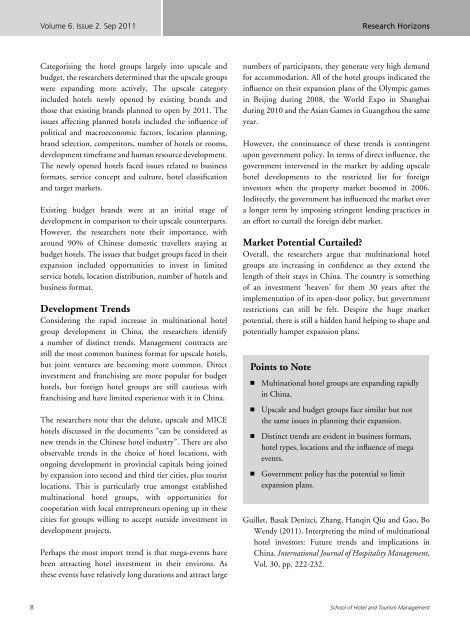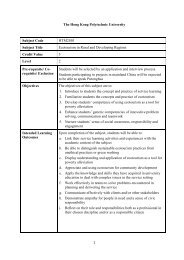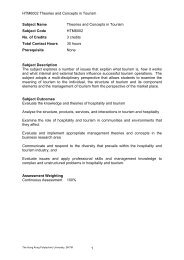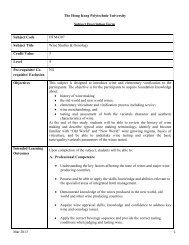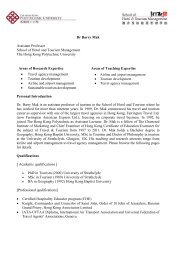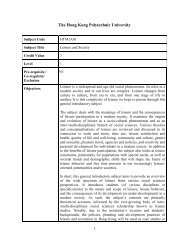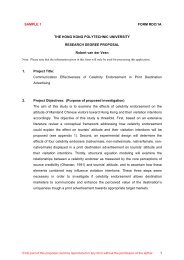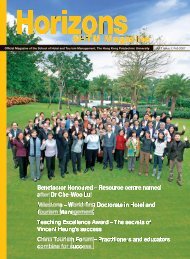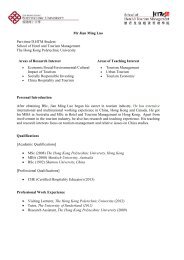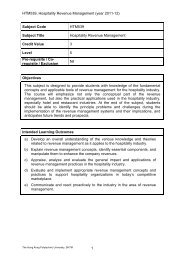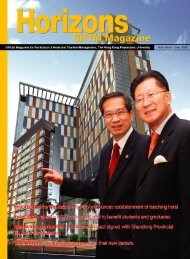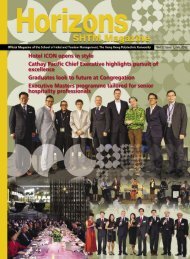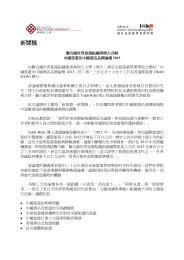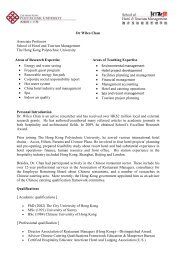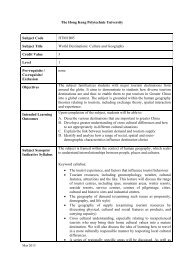Vol 11 Issue 2, September 2011 - School of Hotel & Tourism ...
Vol 11 Issue 2, September 2011 - School of Hotel & Tourism ...
Vol 11 Issue 2, September 2011 - School of Hotel & Tourism ...
Create successful ePaper yourself
Turn your PDF publications into a flip-book with our unique Google optimized e-Paper software.
<strong>Vol</strong>ume 6. <strong>Issue</strong> 2. Sep 20<strong>11</strong>Research HorizonsCategorising the hotel groups largely into upscale andbudget, the researchers determined that the upscale groupswere expanding more actively. The upscale categoryincluded hotels newly opened by existing brands andthose that existing brands planned to open by 20<strong>11</strong>. Theissues affecting planned hotels included the influence <strong>of</strong>political and macroeconomic factors, location planning,brand selection, competitors, number <strong>of</strong> hotels or rooms,development timeframe and human resource development.The newly opened hotels faced issues related to businessformats, service concept and culture, hotel classificationand target markets.Existing budget brands were at an initial stage <strong>of</strong>development in comparison to their upscale counterparts.However, the researchers note their importance, witharound 90% <strong>of</strong> Chinese domestic travellers staying atbudget hotels. The issues that budget groups faced in theirexpansion included opportunities to invest in limitedservice hotels, location distribution, number <strong>of</strong> hotels andbusiness format.Development TrendsConsidering the rapid increase in multinational hotelgroup development in China, the researchers identifya number <strong>of</strong> distinct trends. Management contracts arestill the most common business format for upscale hotels,but joint ventures are becoming more common. Directinvestment and franchising are more popular for budgethotels, but foreign hotel groups are still cautious withfranchising and have limited experience with it in China.The researchers note that the deluxe, upscale and MICEhotels discussed in the documents “can be considered asnew trends in the Chinese hotel industry”. There are alsoobservable trends in the choice <strong>of</strong> hotel locations, withongoing development in provincial capitals being joinedby expansion into second and third tier cities, plus touristlocations. This is particularly true amongst establishedmultinational hotel groups, with opportunities forcooperation with local entrepreneurs opening up in thesecities for groups willing to accept outside investment indevelopment projects.Perhaps the most import trend is that mega-events havebeen attracting hotel investment in their environs. Asthese events have relatively long durations and attract largenumbers <strong>of</strong> participants, they generate very high demandfor accommodation. All <strong>of</strong> the hotel groups indicated theinfluence on their expansion plans <strong>of</strong> the Olympic gamesin Beijing during 2008, the World Expo in Shanghaiduring 2010 and the Asian Games in Guangzhou the sameyear.However, the continuance <strong>of</strong> these trends is contingentupon government policy. In terms <strong>of</strong> direct influence, thegovernment intervened in the market by adding upscalehotel developments to the restricted list for foreigninvestors when the property market boomed in 2006.Indirectly, the government has influenced the market overa longer term by imposing stringent lending practices inan effort to curtail the foreign debt market.Market Potential Curtailed?Overall, the researchers argue that multinational hotelgroups are increasing in confidence as they extend thelength <strong>of</strong> their stays in China. The country is something<strong>of</strong> an investment ‘heaven’ for them 30 years after theimplementation <strong>of</strong> its open-door policy, but governmentrestrictions can still be felt. Despite the huge marketpotential, there is still a hidden hand helping to shape andpotentially hamper expansion plans.Points to Note■ Multinational hotel groups are expanding rapidlyin China.■ Upscale and budget groups face similar but notthe same issues in planning their expansion.■ Distinct trends are evident in business formats,hotel types, locations and the influence <strong>of</strong> megaevents.■ Government policy has the potential to limitexpansion plans.Guillet, Basak Denizci, Zhang, Hanqin Qiu and Gao, BoWendy (20<strong>11</strong>). Interpreting the mind <strong>of</strong> multinationalhotel investors: Future trends and implications inChina. International Journal <strong>of</strong> Hospitality Management,<strong>Vol</strong>. 30, pp. 222-232.8<strong>School</strong> <strong>of</strong> <strong>Hotel</strong> and <strong>Tourism</strong> Management


